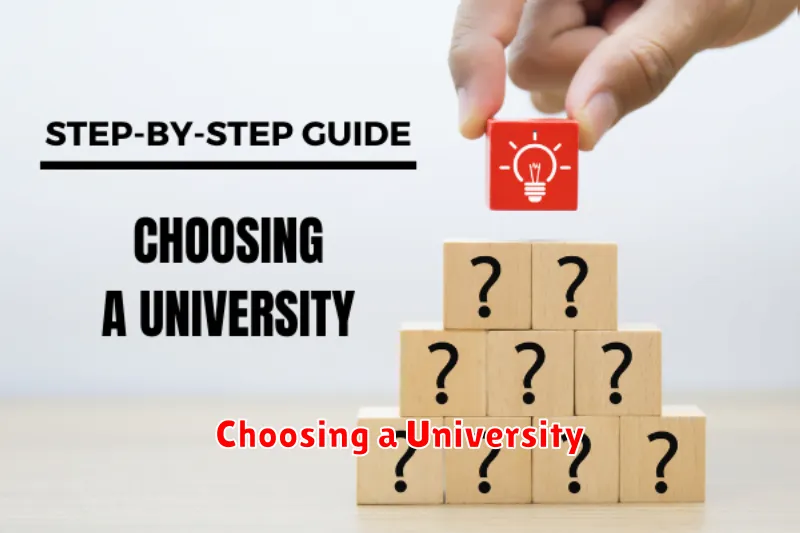Choosing the right university is a pivotal step in shaping your career goals and future success. This decision impacts not only your education but also your professional network and employment opportunities. In this article, we will explore essential factors to consider when selecting the ideal university that aligns with your career aspirations. From understanding the importance of faculty expertise to evaluating campus facilities, every aspect is crucial in crafting a successful academic journey. Whether you’re aiming for a technology-driven path or a more traditional profession, the right educational institution can make all the difference. Let’s delve into the key considerations and equip you with the knowledge to make an informed decision that paves the way for a successful career.
Assess Your Career Interests and Goals
When considering how to choose the right university for your career ambitions, it’s vital to first assess your career interests and goals. Understanding what you are passionate about and where you see yourself in the future is foundational. It helps guide your educational decisions and aligns your academic pursuits with your long-term vision.
Start by identifying the fields or industries that intrigue you. Consider which subjects you have a natural affinity for, and assess whether these align with future career opportunities. Conduct a self-assessment to determine your strengths and weaknesses. This will help in understanding your aptitudes and potential areas of improvement.
Evaluating your long-term career goals is equally important. Think about where you envision your career in 5 to 10 years, and what roles or positions you hope to attain. This vision will assist in mapping out the academic paths necessary to achieve these aspirations.
Once you have a solid understanding of your career interests and goals, you can begin researching universities that offer programs closely aligned with your career path. Ensure that the programs not only cover relevant topics but also provide the skills and experiences needed in your chosen field.
In summary, a thorough assessment of your career interests and goals lays a strong foundation for selecting a university that will best support your professional journey. It ensures that your educational choices are strategic and well-informed, paving the way for a fulfilling career.
Check the Strength of Academic Programs by Major
When choosing the right university to align with your career goals, it is important to assess the strength of academic programs offered by your intended major. This involves a comprehensive evaluation of various factors that contribute to an academic program’s reputation and quality.
Examine the curriculum to ensure it includes updated and industry-relevant content. A robust curriculum should provide a strong foundation in both theoretical knowledge and practical skills. Look for programs with accreditation from recognized bodies, as this is a testament to their quality and credibility.
Consider the faculty expertise, as experienced professors who are active in research or industry can provide invaluable insights and mentorship. Moreover, investigate the resources and facilities available to students, such as state-of-the-art laboratories, libraries, and access to relevant technology.
Finally, seek feedback from current students or alumni about their experiences. Their insights can give you a real-world perspective on the program’s strengths and how well it prepares graduates for the job market.
Location and Campus Life Considerations

When selecting the right university, the location is a crucial factor. Consider whether you would prefer a bustling urban environment or a quieter rural setting. Urban campuses often offer a wide range of professional opportunities and cultural experiences, while rural campuses might provide a more focused academic atmosphere.
Beyond the geographical setting, the local climate can impact your daily life and well-being. If you thrive in warmer climates, choosing a university in a similar region might enhance your overall college experience.
Campus life plays a significant role in shaping your university experience. Investigate the types of extracurricular activities and organizations available on campus. This can range from sports clubs to academic societies, providing opportunities for personal growth and networking.
Additionally, consider the university’s approach to student housing. Some institutions offer on-campus accommodations that foster community engagement, while others have off-campus options that might offer more independence.
Ultimately, aligning the university’s location and campus life with your personal preferences and career goals will empower you to make a well-rounded decision conducive to both academic and personal success.
Internship and Job Placement Opportunities
One of the crucial factors to consider when choosing a university for your career goals is the availability of robust internship and job placement opportunities. These opportunities provide valuable real-world experience that can give you an edge in the competitive job market.
A university with a strong network of industry partnerships can offer significant advantages. These partnerships often translate into a wide range of internship opportunities in your chosen field, allowing you to gain practical skills and a deeper understanding of the industry’s demands.
Additionally, effective career services play a pivotal role in job placement after graduation. Look for universities with dedicated career centers that offer personalized career counseling, resume workshops, and facilitate connections with potential employers. Such services can greatly enhance your chances of securing employment post-graduation.
Research the employment outcomes of graduates from potential universities. High graduate employment rates and successful alumni stories are indicators of a university’s commitment to its students’ career success.
University Reputation in Your Desired Industry
Choosing the right university for your career goals significantly hinges on the institution’s reputation within your desired industry. A university’s standing can affect your chances of securing internships, job offers, and networking opportunities. Therefore, it’s crucial to thoroughly research and understand the institution’s image among industry professionals.
Reputable universities often have strong connections with industry leaders which can lead to valuable partnerships and internships for students. They frequently host guest lectures, workshops, and networking events that can launch your career by connecting you directly with potential employers and mentors.
Look for universities that boast high employability rates among their graduates. This is often a good indicator of how respected the institution is within specific professional circles. Investigating alumni success stories can offer a useful perspective on what you might expect following graduation.
It’s also beneficial to consider the university’s rankings in major education surveys and reports. While rankings are not the sole determinant of a university’s reputation, they often reflect the quality of education and resources available to students.
In conclusion, understanding the reputation of a university in your chosen field is an essential step in making an informed decision about your educational future. A strong reputation can provide a significant advantage in the competitive professional world.
Faculty Credentials and Research Opportunities
When evaluating a university’s potential to advance your career goals, it is essential to consider the credentials of its faculty. Professors with notable academic achievements and substantial industry experience can provide invaluable insights aligned with current professional standards. Their expertise also enhances the quality of education you receive, ensuring you are well-prepared for the ever-evolving job market.
Beyond faculty credentials, research opportunities are a critical factor in choosing the right university. Active involvement in cutting-edge research not only strengthens your understanding of the subject matter but also provides a platform to contribute to advancements in your field. Seek institutions with robust research programs that encourage student participation, showcasing a commitment to innovation and academic excellence.
By prioritizing these elements, you align your educational experience with your professional aspirations, setting a strong foundation for career development.
Class Sizes and Student Support Services
When determining how to choose the right university for your career goals, consider the importance of class sizes. Smaller class sizes often mean more personalized attention from faculty, facilitating a more immersive and engaging academic environment. This could be critical to aligning your educational experiences with your professional aspirations.
Additionally, comprehensive student support services can significantly impact your university experience and ultimate success. Look for universities that offer robust support systems, including academic advising, career counseling, and mental health services. These services can help you navigate university life and prepare effectively for your career.
Balancing these elements will ensure you select a university that not only meets your academic needs but also enhances your overall growth and readiness for the professional world.
Global Alumni Network and Partnerships

When selecting a university that aligns with your career goals, it’s essential to consider the institution’s global alumni network and partnerships. A university with a strong network provides substantial opportunities for mentorship, internships, and employment after graduation.
These connections often translate into a broader range of experiences and insights, helping students to thrive in the global job market. A robust alumni network facilitates networking events and job fairs, which can be pivotal for career advancement.
Furthermore, universities that have established international partnerships allow students to participate in exchange programs and gain global exposure. This experience is invaluable in today’s interconnected world, where employers highly value cultural awareness and adaptability.
Therefore, understanding the scope and reach of a university’s alumni and partnerships can significantly impact your career trajectory by providing resources and opportunities designed to enhance your professional journey.

